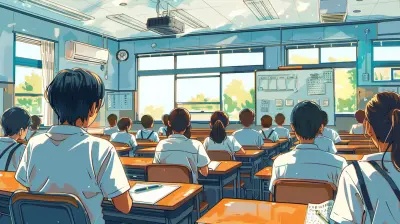How to Recognize the Early Signs of Teacher Burnout
23 June 2025
Let’s face it—teaching can be one of the most rewarding yet mentally and emotionally taxing jobs out there. Educators give their heart and soul every single day, often putting others first while forgetting to check in on themselves. Teacher burnout is real, and it’s more common than most people think. But here’s the deal: it doesn’t happen overnight. The signs creep in slowly, and if you know what to look for, you can catch them early—and do something about it.
In this post, we’re diving into how to recognize the early signs of teacher burnout. Whether you're a teacher, school leader, or someone who loves a teacher, this guide is for you. So, grab a coffee (or that half-cold cup on your desk), and let’s talk about what burnout really looks like—and what you can do to stop it in its tracks.
What Is Teacher Burnout, Really?
Before we start pointing out the signs, let’s get crystal clear on what teacher burnout actually is. In simple terms, it’s the emotional, physical, and mental exhaustion that comes from prolonged stress related to teaching.It’s more than just being tired. It’s a deep, soul-draining fatigue that can affect everything from your passion for teaching to your interactions with students, coworkers, and even your loved ones.
Think of burnout like a slow leak in a tire. At first, your car still runs fine, but over time, the pressure drops and it gets harder to keep moving forward. Eventually, you’re stuck on the side of the road unless you do something about it.
Why Are Teachers Burnt Out?
Here’s the short version: teachers are juggling way too much. The expectations are sky-high, and the support often doesn’t match the workload. Add in oversized classrooms, standardized testing stress, behavioral challenges, lack of resources, minimal breaks, and let’s not forget—trying to live a personal life outside the classroom.It’s a perfect storm for burnout.
So, What Are the Early Signs of Teacher Burnout?
Burnout doesn’t come with a flashing neon sign that says, “Hey! You’re burning out!” But there are red flags—subtle changes you might brush off as something temporary. Let’s break them down.1. Constant Fatigue (Even After a Weekend)
You know that feeling when it’s Sunday night and you already feel exhausted about Monday? If you're constantly drained even after sleeping in or relaxing on the weekend, that’s not just tiredness—it might be the beginning stages of burnout.Our bodies know what’s up, even when our brains pretend everything's fine.
2. Decreased Enthusiasm for Teaching
Remember when you used to get excited about your lesson plans or trying out a new classroom activity? If you find yourself rolling your eyes instead of rolling out ideas, it’s a major sign.Losing that spark for teaching isn’t about being lazy—it’s your emotional battery flashing red.
3. Increased Irritability and Frustration
We’ve all had tough days. But when every little thing starts triggering your temper—students talking too much, colleagues asking questions, the copier jamming again—it’s a sign of mental overload.Burnout sneaks in like a fog, clouding your patience and replacing calm with frustration.
4. Feeling Emotionally Detached
Do you feel like you're going through the motions? Saying the right things, smiling when needed, but feeling completely disconnected from your students or work?This emotional numbness is your brain trying to protect itself by creating distance from stress. But it can make you feel isolated and alone.
5. Physical Symptoms
Burnout isn’t just mental—it hits your body too. Frequent headaches, stomach issues, sleep disorders, muscle tension, or even changes in appetite can be your body's SOS.If your body is acting out and you can’t pinpoint why—burnout might be behind it.
6. Cynicism and Negative Thinking
If you’ve caught yourself saying things like, “What’s the point?” or “Nothing ever changes,” more often than usual, your mindset may be shifting in a not-so-healthy direction.Cynicism is a defense mechanism that often shows up when optimism gets exhausted.
7. Feeling Unappreciated and Undervalued
Teaching is often a thankless job. But when the lack of recognition starts to feel like a heavy weight on your chest, it's time to pause and take notice.Burnout often grows louder when we feel invisible or unsupported.
8. Struggling to Keep Up With Work
When tasks that used to feel manageable now seem overwhelming, or simple things slip through the cracks (forgot to grade that assignment? skipped a meeting?), it’s a red flag.Mental fatigue makes every part of your day feel like climbing uphill with a backpack full of bricks.
How to Differentiate Stress from Burnout
You might wonder, “Is this just a tough week or actual burnout?”Great question.
Stress and burnout are close cousins, but they're not the same. Stress is usually short-term and tied to a specific situation—like parent-teacher conferences or report card time.
Burnout is the long game. It’s chronic. It doesn’t go away with a weekend break or a mental health day. And while stress often makes you feel more engaged and frantic, burnout makes you feel numb and empty.
What Causes Burnout in Teachers?
Let’s take a moment to unpack what’s really fueling the fire:- Unrealistic workload – Too many responsibilities and not enough hours in the day.
- Lack of support – Either from administration, colleagues, or parents.
- Challenging classroom environments – Disruptive behaviors, overcrowded classes, diverse learning needs… the list goes on.
- Pressure to perform – Standardized testing, evaluations, and being “on” all the time.
- Poor work-life balance – Teaching doesn’t stop when the bell rings. After-hours grading and planning can eat into personal life.
Why It's So Important to Catch These Signs Early
Here’s the thing about burnout: the longer it goes unchecked, the harder it is to reverse.Ignoring the signs can lead to:
- Serious mental health issues like depression or anxiety
- Physical health problems from chronic stress
- Leaving the profession altogether—something we’re seeing more and more
But catching it early is like pulling weeds before they can take over your garden. There’s still time to course-correct and recover.
What Can You Do About It?
If any of these signs hit a little too close to home, don’t panic. You’re not alone—and more importantly, there are steps you can take.1. Set Clear Boundaries
Stop answering emails at 9 p.m. Seriously. Set office hours for yourself, and protect your personal time like it’s your last slice of pizza.2. Start Saying No
You don’t have to lead every committee or take on extra duties "just because." Prioritize your well-being.3. Lean on Your Support System
Talk to your co-workers. Join teacher communities. Vent, share strategies, laugh about the chaos together.Sometimes just knowing others get it can be a massive relief.
4. Take Mental Health Days (Guilt-Free!)
You’re allowed to rest. A well-rested teacher is more effective than a burnt-out martyr trying to power through.5. Prioritize Self-Care
Exercise, journal, meditate, or just dance around your living room to your favorite playlist. Whatever recharges your battery—do more of that.6. Talk to a Professional
Therapists, counselors, and coaches can help you sort through the fog and come up with strategies tailored to you.7. Consider Talking to Administration
If possible, have a candid conversation about your workload or challenges you're facing. They might not know you're struggling unless you tell them.A Quick Word for School Leaders
If you’re reading this as a principal or administrator—thank you. Your support can be the difference between a teacher who thrives versus one who leaves the profession.Look out for your team. Check in regularly, create a culture of support, and make staff well-being a real priority—not just a bullet point in a newsletter.
Investing in your teachers’ mental health is investing in your students’ futures.
Final Thoughts
Teaching is a calling, not just a job. But even those with the strongest passion can be worn down by the weight of it all. Recognizing the early signs of teacher burnout is the first step to fighting back.If you’ve seen yourself or someone you care about in any of these signs, now’s the time to take action. Small steps can lead to lasting change.
Your well-being matters. Your energy and joy are not infinite resources—they need care, attention, and sometimes a break. And that’s not weakness. That’s wisdom.
You’re not alone. And you deserve to feel good about the amazing work you’re doing.
all images in this post were generated using AI tools
Category:
Teacher Burnout PreventionAuthor:

Bethany Hudson
Discussion
rate this article
1 comments
Caleb Harper
Spotting burnout early is key; prevention outshines recovery every time!
July 7, 2025 at 4:54 AM

Bethany Hudson
Absolutely! Early recognition is crucial for preventing burnout and ensuring teacher well-being. Thank you for your insight!


